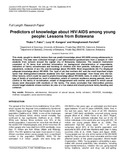Predictors of knowledge about HIV/AIDS among young people: Lessons from Botswana

View/
Date
2010Author
Fako, T.T.
Kangara, L.W.
Forcheh, N.
Publisher
Academic Journals: http://www.academicjournals.org/Type
Published ArticleMetadata
Show full item recordAbstract
This study sought to identify factors that can predict knowledge about HIV/AIDS among adolescents in
Botswana. The data were collected through a self administered questionnaire from a sample of 1294
students from schools around the capital city of Botswana, Gaborone. The research instrument
consisted of 76 items that solicited information on background characteristics of respondents,
indicators of family cohesiveness and bonding of children with their parents, indicators of personal
adjustment, evidence of sex life, and knowledge about HIV/AIDS. Most respondents (63.1%) displayed
adequate knowledge about HIV/AIDS. The ‘type of job that mothers did’ was the most important single
factor that distinguished between students who had “adequate knowledge” from those who did not.
Other factors, which could be used to predict knowledge about HIV/AIDS, were, in order of importance:
type of family of socialisation, level of education, extent of common residence among parents, level of
conflict in the family of socialisation, extent of disagreement with mother and extent to which sexual
issues were discussed with members of the family. The study concludes that intervention policies should target students whose mothers do jobs of a low status and should promote family bonding and
cohesion.
